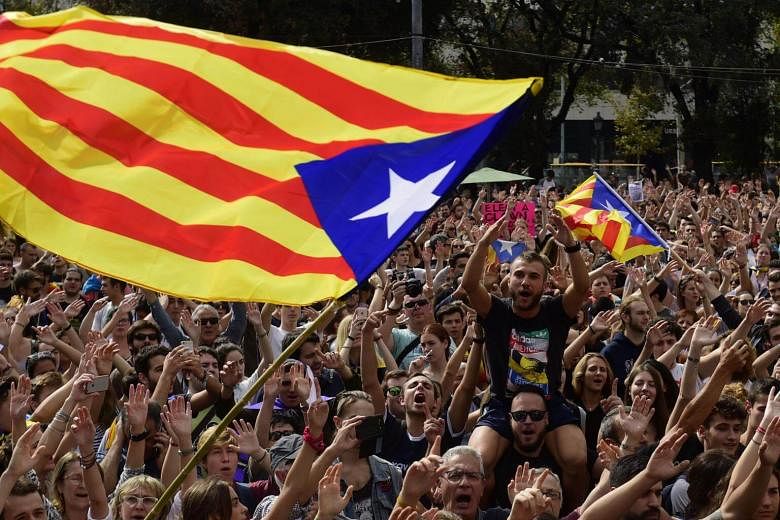LONDON - "We did what we had to do; We are the government of Spain and, as its leader, I assume my responsibility" is how Spanish Prime Minister Mariano Rajoy defended his fierce crackdown on an independence referendum in Spain's restive province of Catalonia over the weekend.
In private, many European leaders doubt the wisdom of Mr Rajoy's decision to use force. Yet few question Spain's right to defend its territorial integrity. And fewer still are in any doubt that the Catalonia crisis carries huge risks for the European continent.
Spain's Catalans claim that they have all the attributes of a distinct nation: their own language, history and culture. That's absolutely true, but hardly very profound, for Europe is full of similar examples of nations or splinter nations living in other states.
There are the Catalans of neighbouring France, a detail conveniently forgotten by Spanish Catalan nationalists eager to reassure other European governments that their quest for independence is peaceful.
Then, there are the Corsicans of France, the Sardinians of Italy, the Basques of Spain, the Scots within the United Kingdom, the Flemish and the Walloons of Belgium, as well as the Hungarians in Slovakia and Romania, the Swedes in Finland, or the Muslims of Turkish origin in Bulgaria, to name but a few.
Each such case is different, but nationalist leaders in one country often use examples from another state to advance their claims. The Scots have argued for decades that all they wanted from the British government is the autonomy enjoyed by the Catalans. And the Catalans, in turn, are now arguing that all they want is the ease by which the Scots were able to hold their own independence referendum.
This constant loop of one nationalist demand pushing for another is what European governments fear most for, if not stopped, it could plunge their continent into its biggest border-changing wave in 200 years.
And while this is unlikely to generate wars as it has done during the 19th century, any rearrangement of the continent's frontiers is certainly likely to paralyse Europe and prevent it from dealing with its real economic challenges. Spain already finds it difficult to implement the necessary austerity measures which its public finances require because these exacerbate separatist tendencies; the same applies to Italy, for example.
This nationalist wave could also destroy the European Union. For, while making borders less important in Europe is rightly regarded as one of the EU's historic achievements, it is also true that the Union is - however unfairly - now accused as being indirectly responsible for the potential disintegration of existing states. Separatists invariably now argue that their quest for independence will cost nothing, and that the EU will offer them prosperity and protection however small and vulnerable they may be.
That's untrue, as the people of Scotland discovered when they debated such matters during their 2014 referendum campaign. And it may be even less true today, for the support which Scottish separatists have given to Catalan separatists will ensure that, if either Catalonia or Scotland ever become independent, Spain alone will veto them from joining the EU for many years thereafter.
Still, the implications of this disintegration trend are so damaging that this alone explains why European Union officials are steering clear of officially discussing the Spanish crisis.
Most importantly, however, is the fact that this is more of a fight over who controls the political narrative, rather than about independence as such. You wouldn't guess it from observing the current showdown that, far from being oppressed, Catalonia is Spain's wealthiest province; demands for independence come from those who, after benefitting from Spain's economic development now resent sharing their wealth.
Nor would a casual observer realise that Catalonia enjoys the kind of autonomy no European or Asian state ever granted its regions. And the separatists don't like to be reminded of the fact that, according to all opinion polls, they remain a minority.
As a referendum, Sunday's Catalan balloting was fundamentally flawed: there was no debate and no electoral rolls and, even before the Spanish police intervened, voters were encouraged to print their own ballot papers on their home computers. With no proper checks against double voting, questions remain over the final vote count.
The purpose of the exercise was not to give an independence claim legitimacy but, rather, to create a crisis which will push Catalonia's silent non-independence majority into the hands of the separatists.
By using violent means the Spanish government may have played right into the hands of its extremists. But despite this tactical error, Spain's government is right to insist that the dispute is ultimately not about the secession of one province, but about who is entitled to represent the interests of all of Spain's 46 million people.


